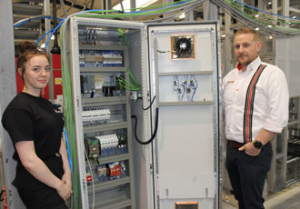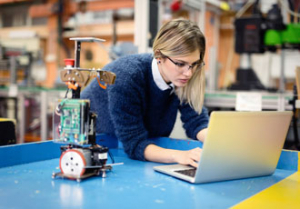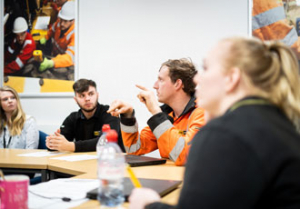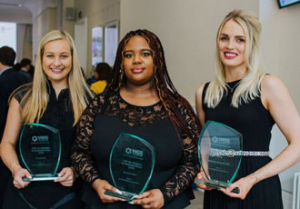What is the key to a career in engineering?

According to the latest statistics by Engineering UK, 42% of girls between 14 and 16 would consider a career in engineering. However, only 12.37% of UK engineers are women. The organisers of Advanced Engineering UK have talked to Dr Lina Huertas, Head of Technology Strategy at The Manufacturing Technology Centre (MTC), about her exciting career and about what educators and employers can do to reduce the gender gap.
In your current position as Head of Technology Strategy at the MTC you have a lot of responsibilities. Can you describe what your role entails?
I am responsible for the technology strategy of the MTC for digital manufacturing, which means that I work with a digital team of about a hundred people to help manufacturers find out the best ways to digitalise their businesses. At the MTC, we have different teams that represents all the sectors we work with, and we are in constant collaboration. Part of my job is to help the digital team assess the needs of these sectors and develop a strategy to tackle them.
I am also responsible for technical quality, which means that I help make sure that the processes and culture to deliver to the highest technical quality become standards that are followed by everyone.
I also look after strategic relationships, for example relationships with academic partners and technology providers who are our key partners. Finally, I represent the MTC within the High Value Manufacturing Catapult, alongside the digital leaders of the other six sister centres. We collaborate with them to define digital strategy for our clients, as well as the national strategy for digital manufacturing.
What are the challenges of manufacturers that require the services of the MTC?
The main challenges are around productivity - speeding up production, improving quality and minimising costs. Another common challenge is how to make businesses more sustainable, since many companies are making big commitments towards net zero carbon emissions.
There are also challenges specific to each sector. For example, in aerospace one of the biggest issues at the moment is how to work with different sectors in response to the crisis caused by COVID-19. Many companies in the sector have seen a drastic reduction in demand, so they must think of ways to supply components to other critical industries, for example medical devices, to retain all the capabilities they have, as well as their skills and talents.
What are the challenges that manufacturers experience when implementing the latest technologies into concrete industrial applications?
There are many barriers, and this is actually the main reason that we and the High Value Manufacturing Catapult exist. Risk is the main obstacle. In academia, new ideas are only tested up to a certain point, in a lab environment. However, only after implementing the technology in an actual production line will you be able to see if it serves the purpose.
In the High Value Manufacturing Catapult network, we have infrastructure similar to the one that you would find in industry, so we can reduce the risks associated to new technologies and solutions before a manufacturer commits to installing a new technology.
In some areas, funding is the biggest barrier, especially when the new technology can’t be implemented in small steps and requires a big initial investment, such as with machinery for additive manufacturing. In our network we have access to a mix of funding that we can use to assess the potential of technologies that are in the earliest phases of development. We also offer mechanisms, such as selecting and trying machines and software before buying it, to reduce the risk of investment.
Skills is another huge barrier to implementing the latest innovations - if you don’t have the people who understand how to operate a new technology, you won’t be able to use it to its full potential. One of the biggest challenges in the introduction of new technologies into manufacturing is the upskilling of personnel. People in industry need to be able to own and drive the technology.
Helping manufacturers into their journey towards digitalisation is clearly a fulfilling career. What sparked your interest for this sector?
My parents have a small manufacturing business, so I was exposed to engineering and manufacturing from very early on in my childhood. I was always involved because they would let me help and give me small jobs when I was on holiday. Engineering was always so present in my life that I don’t remember exactly when this passion started, I think I’ve always wanted to become an engineer.
I guess I was very lucky because no one ever made me feel like I couldn’t become a good engineer because of my gender. I have a sister and a brother and we were always treated exactly the same, given the same jobs, even the same toys.
In the UK, women make up only a small percentage of the workforce in engineering, with sectors such as construction engineering having only about 2%. One of the problems that might contribute to the gender gap is the lack of role models for girls who want to pursue this career. Did you have one?
In university I was very lucky to have a very good professor of thermodynamics. She was a great lecturer, but her main job was as an engineer in industry, and that was very inspiring to me.
She was one of the very few female role models I ever had, but I’ve had many male role models. In the end, I’m not sure that you necessarily need a female role model, you just need someone who’s inspiring and doesn’t treat you any differently than men, someone who makes you realise that you can do what you aim for.
How was your experience as an engineering student?
At university I was in a class of 120 people and there were only eight women. By the end, there were only two of us. It might depend on your personality, but for me, that became normal and even presented me with a stimulating little challenge - knowing that I was one of the only two women who had succeeded in that programme was rewarding.
In your opinion, is there anything that families and educators can do to encourage girls to choose a career in engineering, if this is what they want to do?
For me, the most important thing is to make sure that we give girls and boys the same opportunities and exposure, from early on. If you are a little girl trying to climb a climbing frame and your dress gets tangled everywhere, it’s somehow clear that things are not always the same for you and boys. The climbing frame feels very different if you have to climb it in trousers or in a dress!
We have to make sure we give girls the same exposure to things and the same chances to take on new challenges. It’s difficult to generalise because everyone’s story is different, but in my case, I never felt that there was any difference between me and boys, and that’s why I always thought that I could do whatever I wanted.
We need to create girls and boys who are assertive and know what they want - that’s how they’ll sum up the courage to challenge other people’s prejudices. I was very stubborn, so even if occasionally someone told me that this is not a typical career for a girl, that made me even more determined to pursue it.
There are probably very few people who would explicitly claim that engineering is not a good career for women, but the gender gap is still there
Yes, gender dynamics can be very subtle. At home, if dad only asks for help from the boys in the house when fixing things, and mum only asks for help from the girls in the kitchen, it’s very clear whose job is what. I think we need to make sure that we open up opportunities for children to experience different things, then they’ll feel like they have more choice later in life.
Do you think that closing the gender gap would also help close the skills gap in STEM?
Definitely. Because of the gender gap we are missing out of the talent of about 50% of the population, which is huge. But we are also missing out on the talent of other minorities, for example people who don’t have the resources for a quality education. To really close the skills gap, we must empower everyone to use all of the talent they have to offer.
Dr Lina Huertas is on the Advisory Board of Advanced Engineering UK and regularly contributes to speaker content and to the direction of the event.
Similar articles
More from Advanced Engineering Show
- Advanced Engineering is back for 2021 28th May 2021
- Partnership with SGS to help improve safety and hygiene 31st July 2020
- A thank you to the engineering industry! 21st July 2020
- What is the key to a career in engineering? 17th July 2020












Write a comment
No comments